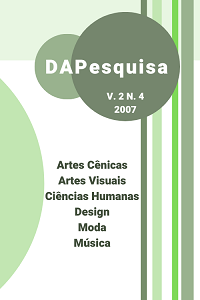As infinitas máscaras da cidade
DOI:
https://doi.org/10.5965/10.5965/1808312902042007128Keywords:
Espaço Teatral, Concepção do Espetáculo, Explosão do Espaço Teatral, Teatro CatarinenseAbstract
Com este estudo, tenho por objetivo o resgate das iniciativas realizadas nas décadas de 1980 e 1990 por grupos de teatro de Florianópolis que se serviram do sentido simbólico e monumental de espaços de tipologia não-italiana, componentes do patrimônio histórico e cultural dessa cidade, para a composição da obra de arte teatral.Downloads
References
ADAMS, Betina. Preservação Urbana: gestão e resgate de uma história: patrimônio de Florianópolis. Florianópolis: Ed. da UFSC, 2002.
FUNARI, Pedro Paulo e PELEGRINI, Sandra C. A. Patrimônio Histórico e Cultural. Rio de Janeiro: Jorge Zahar Editor, 2006.
JAVIER, Francisco. El Espacio Escénico como Sistema Significante. Buenos Aires: Leviatán, 1998.
LE GOFF, Jacques. Por Amor às Cidades. São Paulo: UNESP, 1998.
LIMA, Fátima Costa. Espaços de Encontro no Teatro e no Carnaval. Florianópolis: Dissertação de Mestrado FAED/UDESC, 2003 (inédita).
LIMA, Evelyn Furquim Werneck. Das Vanguardas à tradição: arquitetura, teatro & espaço urbano. Rio de Janeiro: 7Letras, 2006.
PAVIS, Patrice. Dicionário de Teatro. Tradução para a língua portuguesa sob a direção de Jacó Guinsburg e Maria Lúcia Pereira. São Paulo: Perspectiva,1999.
ROUBINE, Jean-Jacques. A Linguagem da Encenação Teatral. Tradução e apresentação de Yan Michalski. Rio de Janeiro: Zahar, 1982.
Downloads
Published
How to Cite
Issue
Section
License
Copyright (c) 2019 Leon de Paula

This work is licensed under a Creative Commons Attribution 4.0 International License.
Authors who publish in this journal agree to the following terms:
The authors retain the copyright and grant the journal the right of first publication, with the study being simultaneously licensed under the Creative Commons Attribution-Noncommercial License, which allows the sharing of work with acknowledgment of authorship and initial publication in this journal.
This journal, following the recommendations of the Open Access movement, provides public access to all its content, following the principle that free access to research leads to a greater global exchange of knowledge.
Plagiarism in all its forms constitutes unethical publication behavior and is unacceptable. The Journal DAPesquisa reserves the right to use software or other methods of detecting plagiarism to analyze submitted works.





